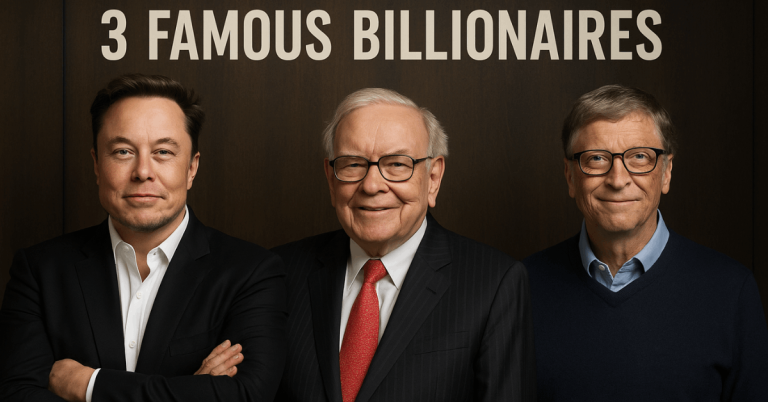Some billionaires are changing lives by giving more than just money. This article covers billionaires who give the most to charity and the causes they support.
Their donations impact education, health, and global development. Learn who they are and how they’re making a difference.
Why Billionaires Donate?
Billionaires donate for various personal and financial reasons. The keyword “billionaires who give the most to charity” connects deeply with this motivation.
Some are driven by moral duty, others by legacy, and many by tax planning. Several also wish to directly impact global inequality.
How Giving Is Tracked and Measured?
Charitable contributions are measured through public filings, pledges, and foundation reports. Some billionaires make headlines while others give anonymously.
Analysts often focus on total lifetime giving and the percentage of net worth donated. Impact also plays a key role in evaluation.

Top 10 Billionaires Who Give the Most to Charity
These billionaires stand out for the sheer scale and impact of their giving. Their donations range from billions in health care to focused education reform.
Some use personal foundations, others prefer direct community funding. The following ten names are leading philanthropic forces today.
1. Warren Buffett
Warren Buffett has donated over $50 billion during his lifetime. He has given most of his fortune to the Bill & Melinda Gates Foundation.
Buffett’s giving focuses on poverty, health, and education. He is also a founding member of The Giving Pledge.
2. Bill and Melinda French Gates
Together, Bill and Melinda Gates have donated more than $38 billion. They focus on global health, education, and vaccines through their foundation.
Their charitable work is highly structured and data-driven. They remain active philanthropists even after their divorce.
3. MacKenzie Scott
MacKenzie Scott has given away over $16 billion since 2019. Her approach is unique: unrestricted donations to smaller organizations.
She targets racial equity, education, and community welfare. Scott operates without a traditional foundation, ensuring fast, low-cost impact.
4. George Soros
George Soros has donated over $18 billion to his Open Society Foundations. He focuses on democracy, human rights, and education globally.
His giving has shaped policies and civil society in multiple countries. Soros is known for combining political advocacy with philanthropy.
5. Michael Bloomberg
Michael Bloomberg has donated over $14 billion through Bloomberg Philanthropies. His giving targets public health, climate change, and education.
He is a strong advocate for gun control and anti-smoking laws. Bloomberg’s philanthropy is guided by measurable results.
6. Mark Zuckerberg and Priscilla Chan
The couple pledged to donate 99% of their Meta shares. So far, they’ve contributed more than $3 billion.
Their Chan Zuckerberg Initiative focuses on science, education, and justice reform. They use an LLC structure to maintain flexibility in spending.
7. Elon Musk
Elon Musk donated nearly $6 billion in Tesla stock in 2021. He supports scientific research, climate efforts, and educational ventures. While he has signed The Giving Pledge, details of his giving are limited. Musk is often criticized for lack of transparency.
8. Azim Premji
Indian billionaire Azim Premji has donated more than $21 billion. His foundation focuses on education and development in rural India.
Premji is among the most generous individuals by percentage of net worth. He emphasizes humility and long-term change.
9. Gordon and Betty Moore
Gordon Moore, co-founder of Intel, and his wife Betty have given over $5 billion. Their foundation supports environmental conservation, healthcare, and science.
They are known for making large but strategic contributions. Their impact is significant, though less publicized.
10. Charles “Chuck” Feeney
Chuck Feeney gave away nearly his entire $8 billion fortune. He co-founded Duty Free Shoppers and later became a secret philanthropist.
He supported education and human rights across the globe. Feeney passed away in 2023, having lived frugally despite his wealth.
Common Causes Supported by These Donors
These top givers often support similar causes that aim for systemic impact. Their generosity is not random but targeted for lasting change. Here are the key areas where their donations flow:
- Education: Universities, scholarships, and education reform receive billions.
- Global Health: Major funding for vaccines, sanitation, and disease eradication.
- Climate Change: Environmental conservation and carbon-neutral initiatives.
- Human Rights: Democracy-building, justice reform, and civil society.
- Scientific Research: Medical and technological advancements.
The Giving Pledge’s Influence
The Giving Pledge is a voluntary commitment to donate at least 50% of wealth. It was founded by Bill Gates and Warren Buffett in 2010.
More than 200 billionaires globally have signed it. While not legally binding, it has reshaped expectations around wealth.
Transparency and Criticism
This section explores the main concerns linked to the actions of wealthy philanthropists. Each point addresses a different criticism with clarity and focus.
Power and Influence
Critics argue that billionaire donors shape public agendas beyond democratic control. Their financial power allows them to influence education, policy, and even global health systems.
Some believe this undermines governments and grassroots initiatives. The lack of checks creates concern about accountability.
Accountability and Oversight
Many foundations operate with minimal regulation, leading to transparency issues. Unlike governments, they don’t answer to voters or boards with diverse interests.
Critics call for independent reviews and public reporting of how money is used. True impact requires more than good intentions—it needs verified results.
Public Perception
Some see billionaire giving as a tool for reputation management. Large donations can deflect criticism from business practices or labor issues.
Philanthropy might improve public image without fixing core problems. This raises debate over what qualifies as genuine altruism.

A Global Impact
These donations create lasting effects across various regions and causes. Africa benefits through expanded health programs and food aid.
Asia experiences progress in technology funding and access to quality education. The U.S. continues to lead in nonprofit activity and scientific research.
Latin America receives support for environmental and justice initiatives. Europe also sees investment in refugee aid and medical development.
Closing Reflection: The Responsibility of Wealth
As wealth concentrates globally, so does the power to solve complex problems. Billionaires who give the most to charity can change systems, not just symptoms.
Their giving should be intentional, transparent, and impactful. True generosity is measured not just in billions, but in lives changed.
Conclusion: Why It Matters?
Philanthropy at this level influences entire nations and sectors. The spotlight on billionaires who give the most to charity reveals more than numbers; it reveals values.
Readers should stay informed about where this wealth goes and how it shapes society. Giving is only powerful when it’s done wisely, and these billionaires are setting that example.





